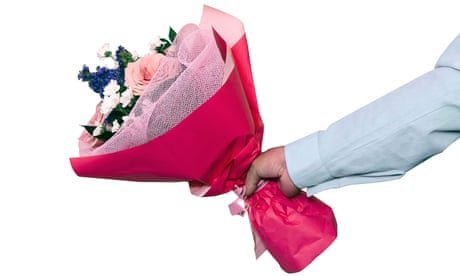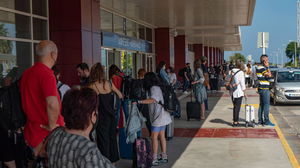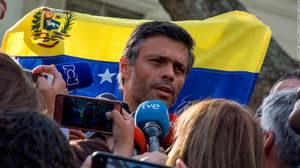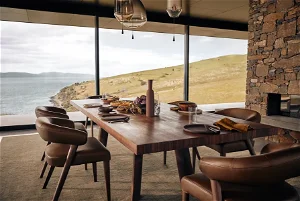Accommodation New Zealand introduces
Maree only wanted to buy some shoes. A pair that she liked the look of had gone on sale, so she made a trip into the city to try them on. It was late in the day in June, mid-winter in Melbourne, and the shopping centre was quiet. After making her purchase, Maree stopped for a coffee. "And that's when it happened," she says.
A young man approached her holding a posy of flowers. He asked Maree to hold them for him as he put on his jacket. "I wish I'd trusted my instincts and said no," she says. "It was all so quick." Maree took the flowers - then the man walked away, wishing her "a lovely day". She held them out after him, bemused.
Then Maree noticed two men operating a camera on a tripod, a few feet away. "I said: 'Did you film that?' and they denied it," says Maree. "I even said to them: 'Do you want these flowers? I don't want them.' They just looked stunned."
Maree went home with her new shoes and the flowers. That evening, her partner received a text from a friend with teenage children: Maree was in a video going viral on TikTok. Not active on social media, Maree "didn't think anything of it. I thought: 'Who watches these TikToks anyway? Oh well.' I didn't even know what viral meant." She paid the video no mind until she saw an article about the interaction in the Daily Mail.
The man who had handed the flowers to Maree was Harrison Pawluk, a 22-year-old TikToker with a following of millions for his "random acts of kindness". Among videos showing him offering hugs to strangers and paying for people's groceries, Pawluk had posted the clip of Maree with the caption "I hope this made her day better", with a red heart emoji and the hashtag "#wholesome". In a little over a week, it had garnered 52m views and 10m likes. "I'm not crying, you are" was one representative comment.
Such "feelgood" content has long been a feature of the social web, dating back to the first days of BuzzFeed and Upworthy - but, since the switch to video, these stories of the kindness of strangers have taken on the form of stunts and social "experiments". On TikTok, the hashtag #randomactsofkindness has 416m views, while #helpingothers has nearly 850m; although not exclusively stunts, #kindness, #wholesome and #positivity are well into the billions.
Over the past decade or so, stories about people unwittingly going viral on social media have become common. Many people working in stock images have spoken out about the surreal experience of their work being turned into memes, from the model who became known as "Hide the Pain Harold" to the photographer responsible for taking the picture that became "distracted boyfriend". "It's not easy," said a Spanish man now renowned internationally as "the worst person you know" after his portrait was used to illustrate a satirical news article.
But, increasingly, people are being made to go viral without their participation or even knowledge, such as the couple whose dramatic breakup on a plane made headlines in 2015 after it was live-tweeted by a fellow passenger. In December last year, a 64-year-old man was filmed at Fabric nightclub in London and went viral in a post mocking his dancing. What were once irregular viral stories have become more frequent as the "content economy" has grown. Worldwide, millions of people make a living from their online followings. Especially since TikTok took off, digital-content production has been frenetic. Now, all the world's a stage - and all of us run the risk of being reduced to mere players in someone else's production.
It highlights a growing tension between content creators' right to freedom of expression, even if it may come at someone else's expense, versus others' right to privacy, even though they may be in a public place. Stunts like Pawluk's may not even immediately register as intrusive to audiences accustomed to viewing strangers' lives on their screens. "We live in an incredibly visual age, where anyone can point the camera at anyone," says Sonia Livingstone, a media and communications professor at the London School of Economics.
One challenge is that the category of content creator or influencer is not easily defined, let alone subjected to ethical or professional codes, encompassing people with vast followings and small ones, big brand deals or day jobs.
What counts as harm is also up for debate when the consequences of going viral vary hugely, and individuals' thresholds for the spotlight differ. "People are living very clearly in different worlds," says Livingstone. "There's no chance that my mum has any idea of what's going on on TikTok - but TikTok might decide to sweep her up in its embrace."
As a lifestyle-content creator herself, Germain is more comfortable than many sharing herself online. Even so, she found the attention overwhelming. She was glad when it passed; now her run-in with Cher is just a "fun fact about me".
In the case of so-called "kindness influencers", the attention may be understood to be welcome. These content creators are giving away money or doing good deeds with the stated aim of inspiring others to do the same. Of course, it can pay off for them, too. Such blandly "uplifting" content can reach huge audiences, allowing the most successful creators to claim big sums in brand partnerships and sponsorship deals.
Pawluk has more than 3 million followers, earning him a reported monthly income of between A$10,000 and A$15,000 (£5,500 and £8,300). He is studying for a double degree in design and business - but only to please his mum, he says over a video call from his bedroom in Melbourne. "Being a video creator is my ultimate purpose."
Typically, Pawluk says, he asks people if they would be willing to appear in a video he is shooting for social media - "and if not, no worries, have a great day." The "kindness" stunts, however, Pawluk films without seeking prior permission, so as to capture the desired "wholesome" reaction. Afterwards, he says, "I will try my best in situations like that to be: 'I've just filmed this video, I was wondering if we could use something like this to inspire others.'" Most people agree, he says - although he will delete footage on request.
In the case of Maree, Pawluk says there was a "miscommunication" by his cameraman. He was surprised to hear, on the ABC, how Maree had felt about his video. "It definitely makes me want to make sure that, in the future, consent is given." Pawluk denies having targeted Maree deliberately as an older woman. After her interview went viral, he was abused online, he says - mostly by older generations.
But, says Anna Derrig, that overlooks the power dynamics at play - not least, who has the privilege of the final cut. Derrig has been researching consent and ethics in memoir and other life-writing for 10 years; she sees parallels between the misappropriation of people's private stories in print and the "personal damage" increasingly being wrought online.
"It's a form of theft," she says. "The person who's telling the story, the influencer in these cases, is the one in control of the narrative - when that's on the internet, that's out there for good."
Seeking permission is not a magic bullet, says Derrig; what matters is "not just consent but informed consent", meaning the subject understands all the risks and possible outcomes. In the case of online attention, these are hard to predict - and virtually impossible to control.
It can easily veer into exploitation. A striking proportion of kindness videos feature people who are living in poverty or otherwise marginalised, and as such assumed to be grateful beneficiaries.
In July, an Afghan asylum seeker said he was "traumatised" by another Australian TikToker swooping in, while he was at the supermarket, to pay for his groceries. In the name of spreading kindness, some content creators even pose as homeless to shame passersby for not giving.
In November, an elderly couple were publicly chastised by an Australian TikToker for ignoring his request for help with opening a bottle of water while he was wearing a prop sling. "They didn't even notice the sling," says the couple's daughter, Amal Awad. "They saw a very tall man walking towards them with a friend. My mum's instincts kicked in and she kept walking, and frankly I don't blame her."
Many of the comments beneath the video were hateful and racist, Awad says. She asked the TikToker to take it down, but he refused, telling her that it was "still pushing" - meaning it was still getting views.
Awad wrote a column describing her family's distress at being landed in a stranger's "social experiment" and calling for society to reckon with what we risk losing in the race for likes. "It's not harmless: every time we click on these videos, we're enabling these content creators to not think bigger and better," she tells me.
We may be nearing an inflection point. The boundary between online and "IRL" (in real life) has been particularly permeable since the pandemic, while gen Z - for whom the distinction has always been less clear - is now the dominant force on social media. It is no coincidence that most clickbait casualties now come via TikTok, where very young people post without the oversight and etiquette of more established platforms. (TikTok declined to comment for this story.)
There is little incentive for platforms to remove material on request or act in accordance with the standards expected of traditional publishers, says Persephone Bridgman Baker, a partner at the law firm Carter-Ruck, who specialises in media, privacy and reputation management.
The merits of any legal action could take into account the motive of the user; any financial gain; the size and nature of the audience reached; the reputational damage done to the subject; any reasonable expectation of privacy; and any public interest in publication. "And what is in the public interest is certainly not the same as what the public finds interesting," adds Bridgman Baker. There is also the danger of "the Streisand effect", she says: that, by trying to tackle compromising material, you risk it circulating more widely.
As more people experience being made into fodder, it seems likely that there will be a cultural shift - although whether it is towards protecting our privacy or casting off what remains of it is yet to be seen. Greater literacy and robust social etiquette could evolve around posting online in the same way as that mostly observed over sharing pictures of children.
Six months on, Maree remains ambivalent about her brush with the internet, but no longer bruised. "I have weathered my particular storm," she says. She even seems tickled by how far her point travelled, with some comments in support gaining 2m likes - "not just sticking up for me, but for the idea that we shouldn't be treating people in this way - that was very heartening", she says.
Maree worries about the erosion of the expectation of privacy: younger generations may not grasp the extent of what they are exposing themselves to, she suggests. "Now, the ordinary person in the street is fair game."
She knows that Pawluk's video is still live, racking up more views and likes. "But I don't really care any more," she says. "I know that it's out there - but it's not really me."























